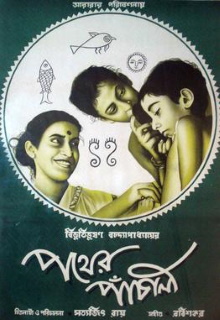After being so impressed with the films of Satyajit Ray that we’ve seen so far, it was inevitable that we would watch Pather Pachali, the Indian grandmaster’s first and best known film. This is the first part of a trilogy so that helps explain why its ending doesn’t seem quite complete. It is of course a masterful work of cinema, detailing the extreme poverty of a family living in a village. I found that I liked it less than his later works however as it doesn’t seem to have a more specific theme than the condition of poverty itself.
Durga is the daughter of Harihar and Sarbajaya, and lives in a village in Bengal. Harihar is educated but ekes out a meagre living as an occasional priest and really wants to be a playwright instead. A very elderly relative Indir lives with them but Sarbajaya resents how she sometimes steals food from the kitchen. Durga loves her however and collects fruit for her from an orchard that used to belong to their family but is now owned by a wealthy neighbor who looks down on them. Despite their poverty, the couple soon have a baby boy who is named Apu and the brother and sister find happiness in all kinds of pleasures including begging money from their father for sweets or take a peek at a travelling vendor’s bioscope. Durga especially does envy the wealth of their neighbors including a bead necklace owned by another girl and she is accused of having stealing habits. Eventually Harihar sets out to the city in search of work but he is gone far longer than expected and the Sarbajaya has to shamefully sell her possessions, borrow money or simply rely on charity to get food.
The craftsmanship in every scene of this film is plain to see and draws you into the characters even when you know nothing about them. Not only are there many shots so memorable that they are convey so much through just visuals alone, but the film is daring in all kinds of interesting ways too. For example, Indir is so wrinkled and gnarly with age that she looks half-dead most of the time and I think most directors would have hesitated to put someone so visibly and even repulsively old on film. But cackly old hag as she may be, you do end up sympathizing with her as she gripes about how an old woman like her needs a new shawl to get through the cold nights. Similarly Durga may well be envious of the small luxuries her neighbors enjoy but she is clever and kind too so we can’t begrudge her wanting a little more than what her family can afford. Despite their poverty and the endless worries of Sarbajaya, the two children and Indir too in her way find their moments of happiness. These moments remind the audience that their lives are worthwhile and meaningful too and that elevates this film beyond just being wallowing in misery.
That said, as solid as the fundamentals of this film are, I still prefer something that has a direction that is more specific than general poverty. One interesting point that could be argued is that the family is so poor because Harihar sees himself as a scholar and a priest. As such he is somewhat disdainful of scrabbling in the dirt for money despite his family’s great need for it and is perhaps taken advantage of by more worldly and mercantile neighbors. He is inclined to dismiss their problems by saying that their fate lies in the hands of the gods and to think positively, to his wife’s endless frustration. That feels like social commentary on the part of Ray and perhaps the novel by Bibhutibhushan Bandyopadhyay upon which this film is based. This is as far as the film in willing to go however in its critique of Indian social conventions and as I noted the story feels incomplete as it’s part of a trilogy.
I can now see how this is considered as one of the masterpieces of Indian cinema and it is doubly impressive that this was the director’s very first film. This is a work that I believe is approachable to just about anyone and its age is no barrier to appreciating it at all. Yet I like the other two films that I’ve watched by Ray much more because their themes feel so much specific and unique. No doubt we’ll get around to watching the rest of the trilogy some day and we’ll see if I revise my opinion of this epic story of the life of Apu.

One thought on “Pather Panchali (1955)”